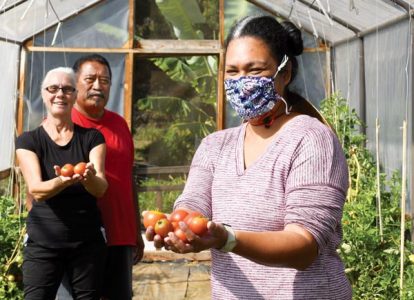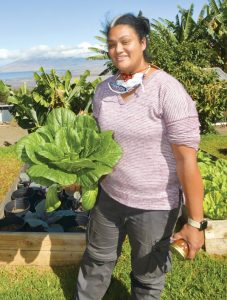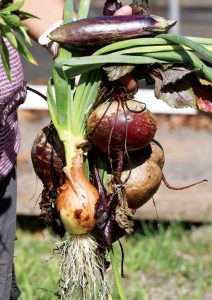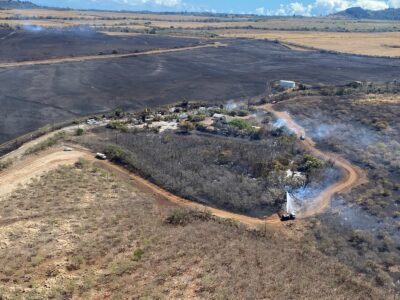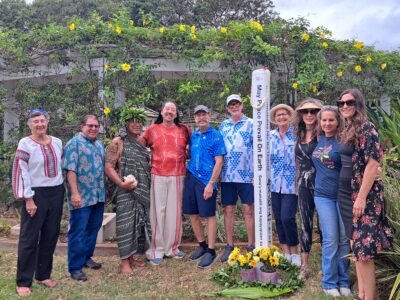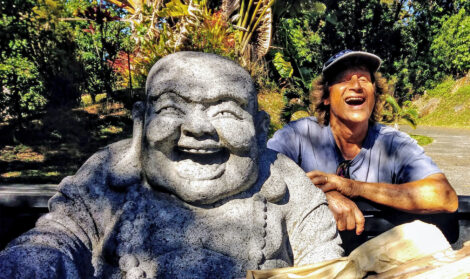Online platform to help farmers sell locally
Maui homesteader tapped to operate ‘Amazon-style’ distribution system
Keokea homesteader Theresa Hi’ilei Martinson is hopeful for a future where the Maui community can live and support a farm-to-table lifestyle.
After being named manager for Project Mahi’ai, where Martinson will help design and operate an “Amazon-style” distribution system that connects consumers to locally grown products, she said, “I’m incredibly excited” and “humbled” to have the opportunity to work toward that vision.
“I know a lot of farmers sell to family and friends, you know, through word of mouth, so being able to launch that idea on a bigger platform, that’s really exciting,” she said on Wednesday afternoon. “Empowering more people to grow and produce their own food and being self-sufficient and empowering our community — I’m really passionate about that part.”
The Office of Hawaiian Affairs provided a grant of $58,395 to fund the online platform, which will allow local purveyors, specifically Native Hawaiian farmers and ranchers, to independently sell their produce.
Maui-based nonprofit Pa’upena Community Development Corporation is helping to execute the grant for the project.
The project’s name serves a dual purpose — mahi’ai is the Hawaiian word for farmer and is an acronym for “mea ‘ai Hawaii in the ‘aina to ingestion,” which is translated to “Hawaiian food from farm to table” or interpreted as “grown by the native community,” Martinson explained.
Participating farmers can post their seasonal products on the soon-to-be Project Mahi’ai website with their personalized listing price; 100 percent of the profit goes toward the seller in the form of a paycheck about every two weeks.
Customers will be able to purchase items online with a credit card and coordinate a pickup or drop-off with the vendor “while still being able to social distance and take care of ourselves and our community,” she said.
“We have received a huge interest already in both selling and buying,” said Martinson, adding that this program also narrows in on the backyard farmers or family farmers and other small business ranchers who are interested in entrepreneurship.
“I think it will give them the opportunity,” she said. “Even a small yard can produce so much food and give them a chance to build a business.”
The inspiration for the project came from a desire to motivate fellow Native Hawaiian cultivators and to help fulfill Gov. David Ige’s “priority for food sovereignty,” as well as to incentivize the state Department of Hawaiian Home Lands to provide more agricultural homestead lots on Maui, she said Thursday.
The nature of the COVID-19 pandemic also created a need for a type of program that could help with food insecurity while also maintaining social distancing and other safety measures.
Once launched, Project Mahi’ai will include items like vegetables, fruits, meats, eggs and dairy. For farmers who may not have the land capacity to grow, an option could be selling starters for lettuce or tomato plants or tree seedlings.
In the future, Martinson hopes to expand the program to offer items higher up in the production process, like jams, jellies and bread.
So far, a Hawaiian veteran farmer at Waiohuli homestead has already shown interest in offering garden-fresh produce, such as mangos and dragon fruit, and a Keokea homelands cultivator has eggplant and tomatoes.
Thomas Emmsley of Waiehu Kou 4 homestead, Kihapai Horticultural LLC, said in a news release that his beekeeping family plans to provide honey.
Emmsley added that “native farmers need an initiative like Project Mahi’ai” because the pandemic “has changed the economic landscape.”
Martinson plans to list some of her items that she grows on the homestead as well, such as taro, bananas, squash and native mamaki tea.
Eventually, all products purchased through the website will carry the “Grown by the Native Community” label.
She anticipates that students of Ke Kula ‘o Maui ma Kekaulike, the Hawaiian language immersion program at King Kekaulike High School, will be involved with the development of the logo.
In the long run, “I think this can have a change in our future generations and get our keiki involved with growing things,” she said.
She envisions that this “much-needed” program will encourage people to support and buy from their neighbors and be less reliant on big box stores.
The year-round Maui program is set to go live online on or after Oct. 1 and will be open to islandwide consumers, including visitors.
Martinson said they have been working with different website designers to lock down a platform for Project Mahi’ai and will be releasing the link later this month. The project’s website will likely be a subdomain of Pa’upena’s website, which can be viewed at www.paupena.org.
“We are in works to have it as a three-year-long project right now and hope to acquire additional funding to make it a permanent resource,” she said.
For information, call Martinson at 779-5143 or email projectmahiai@gmail.com.
* Dakota Grossman can be reached at dgrossman@mauinews.com.
- Project Mahi‘ai Manager Theresa Hi‘ilei Martinson poses Thursday morning with Kewalo tomatoes grown by Keokea neighbors John and Victoria Keanaaina of Keanaaina Farm. The Maui News / MATTHEW THAYER photo
- Project Mahi‘ai Manager Theresa Hi‘ilei Martinson holds a fresh-picked head of mustard cabbage grown at Keanaaina Farm Thursday. The Maui News / MATTHEW THAYER photo
- Martinson holds some fresh-picked produce from Keanaaina Farm that includes beets, onion and eggplant. The Maui News / MATTHEW THAYER photo

